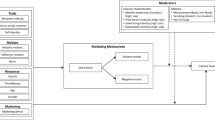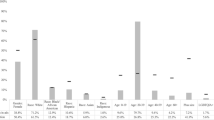Abstract
This study examines the effects of nostalgia marketing on consumers’ evaluation of a brand extension product. In Study 1, participants who were presented with nostalgic advertisements gave more positive evaluations of the extension product than did participants who were shown advertisements without any nostalgia-evoking stimuli. In particular, in Study 2, the nostalgia effect was reinforced in participants who were primed with collective nostalgia rather than personal nostalgia. Lastly, in Study 3, the nostalgia effect on the evaluations of the extension product was more pronounced for participants who were primed with interdependent self than independent self.



Similar content being viewed by others
References
Aaker, D.A., and K.L. Keller. 1990. Consumer evaluations of brand extensions. Journal of Marketing 54 (1): 27–41.
Aaker, J.L., and A.Y. Lee. 2001. ‘I’ seek pleasures and ‘we’ avoid pains: The role of self-regulatory goals in information processing and persuasion. Journal of Consumer Research 28 (1): 33–49.
Ahluwalia, R. 2008. How far can a brand stretch? Understanding the role of self-construal. Journal of Marketing Research 45 (3): 337–350.
Baker, S.M., and P.F. Kennedy. 1994. Death by nostalgia: A diagnosis of context-specific cases. ACR North American Advances 21 (1): 169–174.
Barone, M.J., P.W. Miniard, and J.B. Romeo. 2000. The influence of positive mood on brand extension evaluations. Journal of Consumer Research 26 (4): 386–400.
Barrett, F.S., K.J. Grimm, R.W. Robins, T. Wildschut, C. Sedikides, and P. Janata. 2010. Music-evoked nostalgia: Affect, memory, and personality. Emotion 10 (3): 390–403.
Batcho, K.I. 2007. Nostalgia and the emotional tone and content of song lyrics. The American Journal of Psychology 120 (3): 361–381.
Brewer, M.B., and W. Gardner. 1996. Who is this’ We’? Levels of collective identity and self representations. Journal of Personality and Social Psychology 71 (1): 83–93.
Cheung, W.Y., T. Wildschut, C. Sedikides, E.G. Hepper, J. Arndt, and A.J. Vingerhoets. 2013. Back to the future: Nostalgia increases optimism. Personality and Social Psychology Bulletin 39 (11): 1484–1496.
Hart, C.M., C. Sedikides, T. Wildschut, J. Arndt, C. Routledge, and A.J. Vingerhoets. 2011. Nostalgic recollections of high and low narcissists. Journal of Research in Personality 45 (2): 238–242.
Hayes, A. F. 2012. PROCESS: A versatile computational tool for observed variable mediation, moderation, and conditional process modeling. White Paper, The Ohio State University. Accessed 18 Jan 2013. http://www.afhayes.com/public/process2012.pdf.
Hayes, A.F. 2013. Introduction to mediation, moderation, and conditional process analysis. Regression-based approach. New York, NY: Guilford.
Hepper, E.G., T.D. Ritchie, C. Sedikides, and T. Wildschut. 2012. Odyssey’s end: Lay conceptions of nostalgia reflect its original homeric meaning. Emotion 12 (1): 102–119.
Holak, S.L., and W.J. Havlena. 1998. Feelings, fantasies, and memories: An examination of the emotional components of nostalgia. Journal of Business Research 42 (3): 217–226.
Holbrook, M.B. 1993. Nostalgia and consumption preferences: Some emerging patterns of consumer tastes. Journal of Consumer Research 20 (2): 245–256.
Holbrook, M.B., and R.M. Schindler. 2003. Nostalgic bonding: Exploring the role of nostalgia in the consumption experience. Journal of Consumer Behavior: An International Research Review 3 (2): 107–127.
Johnson, Z.S., H. Mao, S. Lefebvre, and J. Ganesh. 2019. Good guys can finish first: How brand reputation affects extension evaluations. Journal of Consumer Psychology 29 (4): 565–583.
Juhl, J., T. Wildschut, C. Sedikides, T. Diebel, W.Y. Cheung, and A.J. Vingerhoets. 2020. Nostalgia proneness and empathy: Generality, underlying mechanism, and implications for prosocial behavior. Journal of Personality 88 (3): 485–500.
Jun, S.Y., T. Mazumdar, and S.P. Raj. 1999. Effects of technological hierarchy on brand extension evaluations. Journal of Business Research 46 (1): 31–43.
Kim, H., and D.R. John. 2008. Consumer response to brand extensions: Construal level as a moderator of the importance of perceived fit. Journal of Consumer Psychology 18 (2): 116–126.
Leunissen, J.M., C. Sedikides, T. Wildschut, and T.R. Cohen. 2018. Organizational nostalgia lowers turnover intentions by increasing work meaning: The moderating role of burnout. Journal of Occupational Health Psychology 23 (1): 44–57.
Loveland, K.E., D. Smeesters, and N. Mandel. 2010. Still preoccupied with 1995: The need to belong and preference for nostalgic products. Journal of Consumer Research 37 (3): 393–408.
Ma, Q., K. Wang, X. Wang, C. Wang, and L. Wang. 2010. The influence of negative emotion on brand extension as reflected by the change of N2: A preliminary study. Neuroscience Letters 485 (3): 237–240.
Markus, H.R., and S. Kitayama. 1991. Culture and the self: Implications for cognition, emotion, and motivation. Psychological Review 98 (2): 224–253.
Markus, H., and Z. Kunda. 1986. Stability and malleability of the self-concept. Journal of Personality and Social Psychology 51 (4): 858.
Masuda, T., and R.E. Nisbett. 2001. Attending holistically versus analytically: Comparing the context sensitivity of Japanese and Americans. Journal of Personality and Social Psychology 81 (5): 922.
Matsunaga, M., T. Isowa, K. Yamakawa, Y. Kawanishi, H. Tsuboi, H. Kaneko, and H. Ohira. 2011. Psychological and physiological responses to odor-evoked autobiographic memory. Neuroendocrinology Letters 32: 774–780.
Merchant, A., and G.M. Rose. 2013. Effects of advertising-evoked vicarious nostalgia on brand heritage. Journal of Business Research 66 (12): 2619–2625.
Monga, A.B., and D.R. John. 2007. Cultural differences in brand extension evaluation: The influence of analytic versus holistic thinking. Journal of Consumer Research 33 (4): 529–536.
Monga, A.B., and D.R. John. 2010. What makes brands elastic? The influence of brand concept and styles of thinking on brand extension evaluation. Journal of Marketing 74 (3): 80–92.
Muehling, D.D., and V.J. Pascal. 2011. An empirical investigation of the differential effects of personal, historical, and non-nostalgic advertising on consumer responses. Journal of Advertising 40 (2): 107–122.
Muehling, D.D., and D.E. Sprott. 2004. The power of reflection: An empirical examination of nostalgia advertising effects. Journal of Advertising 33 (3): 25–35.
Ng, S., and M.J. Houston. 2006. ‘Exemplars or beliefs? The impact of self-view on the nature and relative influence of brand associations. Journal of Consumer Research 32 (4): 519–529.
Nisbett, R.E., K. Peng, I. Choi, and A. Norenzayan. 2001. Culture and systems of thought: Holistic versus analytic cognition. Psychological Review 108 (2): 291–310.
The new Oxford dictionary of English. 1998. Oxford, England: Oxford University Press.
Park, C.W., S. Milberg, and R. Lawson. 1991. Evaluation of brand extensions: The role of product feature similarity and brand concept consistency. Journal of Consumer Research 18 (2): 185–193.
Pascal, V.J., D.E. Sprott, and D.D. Muehling. 2002. The influence of evoked nostalgia on consumers’ responses to advertising: An exploratory study. Journal of Current Issues & Research in Advertising 24 (1): 39–47.
Reddy, S.K., S.L. Holak, and S. Bhat. 1994. To extend or not to extend: Success determinants of line extensions. Journal of Marketing Research 31 (2): 243–262.
Reid, C.A., J.D. Green, T. Wildschut, and C. Sedikides. 2015. Scent-evoked nostalgia. Memory 23 (2): 157–166.
Sedikides, C. 1992. Changes in the valence of the self as a function of mood. Review of Personality and Social Psychology 14: 271–311.
Sedikides, C., and M.B. Brewer, eds. 2001. Individual self, relational self, collective self. Hove: Psychology Press.
Schindler, R.M., and M.B. Holbrook. 2003. Nostalgia for early experience as a determinant of consumer preferences. Psychology & Marketing 20 (4): 275–302.
Sedikides, C., and T. Wildschut. 2019. The sociality of personal and collective nostalgia. European Review of Social Psychology 30 (1): 123–173.
Sedikides, C., and T. Wildschut. 2016. Past forward: Nostalgia as a motivational force. Trends in Cognitive Sciences 20 (5): 319–321.
Sedikides, C., T. Wildschut, and D. Baden. 2004. Nostalgia: Conceptual issues and existential functions. In Handbook of experimental existential psychology, ed. J. Greenberg, S.L. Koole, and T. Pyszczynski, 200–214. New York: Guilford.
Singelis, T.M. 1994. The measurement of independent and interdependent self-construals. Personality and Social Psychology Bulletin 20 (5): 580–591.
Smith, D.C., and C.W. Park. 1992. The effects of brand extensions on market share and advertising efficiency. Journal of Marketing Research 29 (3): 296–313.
Stephan, E., T. Wildschut, C. Sedikides, X. Zhou, W. He, C. Routledge, and A.J.J.M. Vingerhoets. 2014. The mnemonic mover: Nostalgia regulates avoidance and approach motivation. Emotion 14: 545–561.
Stephan, E., C. Sedikides, and T. Wildschut. 2012. Mental travel into the past: Differentiating recollections of nostalgic, ordinary, and positive events. European Journal of Social Psychology 42: 290–298.
Swaminathan, V., K.L. Page, and Z. Gürhan-Canli. 2007. ‘My’ brand or ‘our’ brand: The effects of brand relationship dimensions and self-construal on brand evaluations. Journal of Consumer Research 34 (2): 248–259.
Van Baaren, R.B., W.W. Maddux, T.L. Chartrand, C. De Bouter, and A. Van Knippenberg. 2003. It takes two to mimic: Behavioral consequences of self-construals. Journal of Personality and Social Psychology 84 (5): 1093–1102.
Verplanken, B. 2012. When bittersweet turns sour: Adverse effects of nostalgia on habitual worriers. European Journal of Social Psychology 42: 285–289.
Vess, M., J. Arndt, C. Routledge, C. Sedikides, and T. Wildschut. 2012. Nostalgia as a resource for the self. Self and Identity 11 (2): 273–284.
Völckner, F., and H. Sattler. 2006. Drivers of brand extension success. Journal of Marketing 70 (2): 18–34.
Wildschut, T., M. Bruder, S. Robertson, W.A. Van Tilburg, and C. Sedikides. 2014. Collective nostalgia: A group-level emotion that confers unique benefits on the group. Journal of Personality and Social Psychology 107 (5): 844–863.
Wildschut, T., C. Sedikides, J. Arndt, and C. Routledge. 2006. Nostalgia: Content, triggers, functions. Journal of Personality and Social Psychology 91 (5): 975–993.
Wildschut, T., C. Sedikides, C. Routledge, J. Arndt, and F. Cordaro. 2010. Nostalgia as a repository of social connectedness: The role of attachment-related avoidance. Journal of Personality and Social Psychology 98 (4): 573–586.
Zhou, X., C. Sedikides, T. Wildschut, and D. Gao. 2008. Counteracting loneliness: On the restorative function of nostalgia. Psychological Science 19 (10): 1023–1029.
Zhou, X., W.A. Van Tilburg, D. Mei, T. Wildschut, and C. Sedikides. 2019. Hungering for the past: Nostalgic food labels increase purchase intentions and actual consumption. Appetite 140: 151–158.
Zhou, X., T. Wildschut, C. Sedikides, X. Chen, and A.J. Vingerhoets. 2012a. Heartwarming memories: Nostalgia maintains physiological comfort. Emotion 12 (4): 678–684.
Zhou, X., T. Wildschut, C. Sedikides, K. Shi, and C. Feng. 2012b. Nostalgia: The gift that keeps on giving. Journal of Consumer Research 39 (1): 39–50.
Author information
Authors and Affiliations
Corresponding author
Additional information
Publisher's Note
Springer Nature remains neutral with regard to jurisdictional claims in published maps and institutional affiliations.
Appendices
Appendix 1
See Table
1.
Appendix 2
See Table
2.
Appendix 3
See Table
3.
Appendix 4
See Table
4.
Rights and permissions
About this article
Cite this article
Jun, S.Y., Park, H.K. & Kim, K.H. The effects of nostalgia marketing on consumers’ brand extension evaluation. J Brand Manag 29, 271–286 (2022). https://doi.org/10.1057/s41262-021-00264-4
Revised:
Accepted:
Published:
Issue Date:
DOI: https://doi.org/10.1057/s41262-021-00264-4




